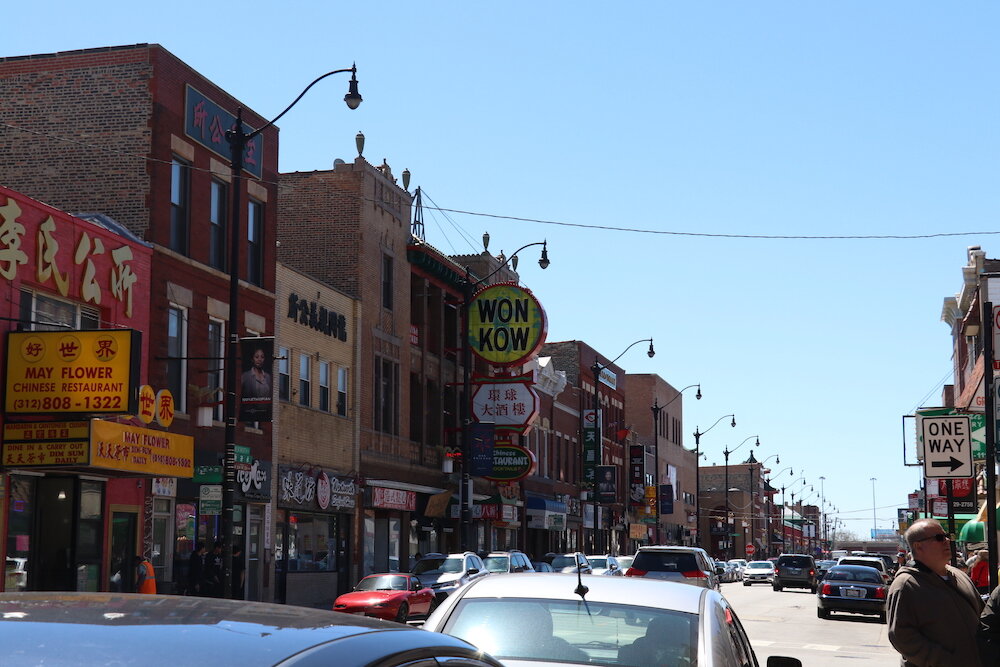The pandemic poses new challenges for voter participation in the Chinatown area with a history of low voter turnout.
By Linghua (Lily) Qi
With new polling locations and the ongoing pandemic, Chinese American organizers are hoping that Chinatown residents will still turn out to vote. (Photo: Linghua Lily Qi)
One in ten eligible voters in the 2020 election is a naturalized citizen. The power of the immigrant vote, both in raw numbers and as a percentage of the electorate, is at a record high. However, in the Chinatown area where many Chinese immigrants in Chicago reside, voter turnout in 2018 was only 38%; turnout in that area is routinely lower than the city average.
Coalition for a Better Chinese American Community, a policy and advocacy organization based in the Chinatown area, tries to engage the Chinese Americans in the Greater Chicago area in civic life through various workshops and events. Grace Chan McKibben, the executive director at CBCAC, spoke with City Bureau about voter mobilization, heated issues on the ballot for the Chinese population, and other concerns for community members. This conversation has been edited and condensed.
From your experience working in Chinatown, what in general makes voting in Chinatown so challenging?
It's difficult on a whole lot of fronts. A lot of immigrants are not familiar with English. Even though to pass the citizenship test you have to pass some civic education in English, older folks who've been in the US for longer than 15 years, can waive that requirement. Some older folks who may be citizens may not really know that much English at all. There's also the cultural barrier [for people who] are just not familiar enough with the government system in the U.S., and so they don't participate because it takes a while to get to know all the candidates. Also, in the Chinatown area, a lot of people have lower incomes and have to work all day, [so] voting and getting to know the candidates would not be the first thing they want to do.
For this year specifically, did the pandemic pose any new challenges?
We worked on voter registration and voter turnout in the March primary race, which was pretty challenging because COVID was starting to be more serious. We previously would have done a lot of door-knocking, a lot of public events or public outreach, tabling, and so on. And we've been focusing mostly on social media and telephone outreach through other organizations thus far.
How is this year’s voting different from past elections?
The polling places that people are used to may not be the same. Everyone has to pay attention to the Chicago Board of Elections website … and see what the changes are in every neighborhood. So this isn't only affecting the Chinese American community but other communities too.
How about mail-in ballots?
Our voters who have voted in the past three elections would have gotten a letter asking them if they wanted to apply for vote-by-mail, but that only applies to the most frequent voters. The immigrant populations tend to not vote because they either have a language barrier or cultural barrier. They are the least likely to have received this mailing, explaining what they have to do, and the mailing was in English. Fortunately, the Chicago Board of Elections website does have multiple languages. Once people can get on the website, they can select Chinese or Polish or Hindi. But that presumes that folks are comfortable searching on the internet and navigating the website.
Let’s talk a little bit about the income tax amendment. What does it mean for the Chinese or Asian community in Chicago?
This is important because Illinois does need more taxes to support the budget and also to support continuing programs such as immigrant services. The ‘fair tax’ amendment doesn't propose a particular set of new taxes, but it removes the restriction on the Illinois Constitution for the income tax system. And that would allow future state legislatures to pass laws that would tax people that make more money at a higher rate...that's what's important for people to understand what they're voting for this time.
How about the state-funded programs and resources for the immigrant community, would that be affected?
One very prominent example was that during Governor Rauner’s administration, they did not pass a state budget [for multiple years] … and as a consequence, most of the state-supported services, including a lot of the services [for immigrants went unfunded]. With more resources, it is more possible to advocate for increases in these services. These would include helping green card holders apply for citizenship, helping immigrants access health care, or other services like supporting them applying for public benefits.
What are other issues that you think are important for the Chinese community on the ballot?
So on the ballot, there are three city-wide referenda items and the ‘fair tax’ constitutional change referendum. I think that [the equitable planning referendum is] important to the Chinatown community. It's important to have equitable training being one of the primary considerations of the city's planning department because there are so many different communities and it's important to make sure that all of the different communities’ needs are heard in the planning process.
What are the issues that are not on the ballot but are crucial for the Chinese community?
Some things that a lot of folks are worried about in Chinatown and the surrounding areas are how to stabilize property taxes. I hear a lot of folks worried about property taxes going up without any plans for looking at that. And then also about the small businesses, whether there's any resources or special planning for that population ... They want to know where to get help and how to get help [with property taxes].
Support City Bureau’s community-centered reporting by becoming a City Bureau Press Club member today.
To get twice-monthly emails including Chicago news and events, sign up for City Bureau’s Chicago newsletter.

